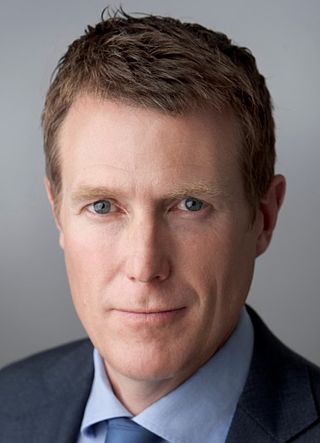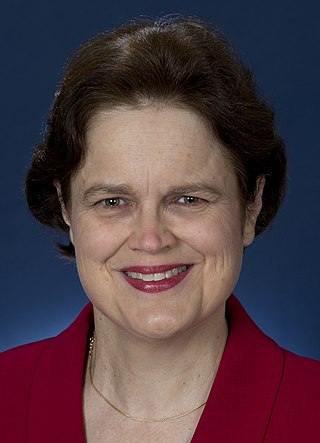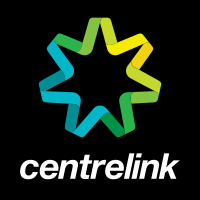
Tertiary education fees in Australia are payable for courses at tertiary education institutions. Responsibility for fees in vocational education and training (VET) rests primarily with the state and territory governments, while fees policy in higher education is largely controlled by the Commonwealth Government.
A tax file number (TFN) is a unique identifier issued by the Australian Taxation Office (ATO) to each taxpaying entity—an individual, company, superannuation fund, partnership, or trust. Not all individuals have a TFN, and a business has both a TFN and an Australian Business Number (ABN). If a business earns income as part of carrying on its business, it may quote its ABN instead of its TFN.
Services Australia, formerly the Department of Human Services and before that the Department of Social Security, is an executive agency of the Australian Government, responsible for delivering a range of welfare payments, health insurance payments, child support payments and other support services to eligible Australian citizens and permanent residents. Services Australia delivers social services through the government programs Centrelink, Medicare, the PBS and the Child Support Agency. Eligible Australian citizens and permanent residents can access many of these services through a myGov account.
The Medical Rural Bonded Scholarship (MRBS) Scheme is an Australian government program designed to address the shortage of doctors in rural areas. As part of the scheme doctors are required to work for 20 hours per week in an area classified as RA2-5 for 9 months of the year over 4-5.5 years, once they have attained Fellowship and commenced their return of service period. Where these doctors work for the rest of the time is up to them, the location they choose to work in is also up to them. although they are restricted to working in areas classified as RA2-5 for their return of service.
Social security, in Australia, refers to a system of social welfare payments provided by Australian Government to eligible Australian citizens, permanent residents, and limited international visitors. These payments are almost always administered by Centrelink, a program of Services Australia. In Australia, most payments are means tested.

Stuart Rowland Robert is an Australian former politician who served as Minister for Employment, Workforce, Skills, Small and Family Business from 2021 to 2022, following his appointment as Minister for Government Services and Minister for the National Disability Insurance Scheme in 2019. He was also appointed Acting Minister for Education and Youth in December 2021 and was the Member of Parliament (MP) for Fadden upon winning the seat at the 2007 federal election, until his resignation in May 2023.

Charles Christian Porter is an Australian former politician and lawyer who served as the 37th Attorney-General of Australia from 2017 to 2021 in the Turnbull government and the subsequent Morrison government. He was a Member of Parliament (MP) for the Division of Pearce from 2013 to 2022 and a member of the Liberal Party of Australia. Porter also served as Leader of the House and Minister for Industrial Relations from 2019 to 2021, and Minister for Industry, Science and Technology in 2021 following his resignation as attorney-general.

Alan Tudge is an Australian former politician. He was a Liberal Party member of the House of Representatives between 2010 and 2023. He was a cabinet minister in the Morrison government from 2019 to 2022.
The Department of Social Security was a government department in Australia, which administered the Social Security system between 1972 and 1998. The department was one of several new departments established by the Whitlam government and was managed by the Minister for Social Security.

Frances Jennifer Adamson, is an Australian public servant and diplomat who is the 36th Governor of South Australia, in office since 7 October 2021. She previously served as Australian Ambassador to China from 2011 to 2015 and as secretary of the Department of Foreign Affairs and Trade from 2016 to 2021.

The 2014 Australian federal budget was the federal budget to fund government services and operations for the 2014/15 financial year. The 2014 budget was the first delivered by the Abbott government, since the Coalition's victory in the 2013 Australian federal election. Treasurer Joe Hockey presented the budget to the House of Representatives on 13 May 2014.
Finn Axel Pratt is a retired senior Australian public servant. He was most recently Secretary of the Department of the Environment and Energy.

Kathryn Jane Campbell, is a former Australian public servant and a former senior officer in the Australian Army Reserve.

The Turnbull government was the federal executive government of Australia led by the 29th prime minister of Australia, Malcolm Turnbull, from 2015 to 2018. It succeeded the Abbott government, which brought the Coalition to power at the 2013 Australian federal election. The government consisted of members of Australia's Liberal-Nationals Coalition. Turnbull took office by challenging his leader, Tony Abbott, in an internal leadership ballot. Warren Truss, the leader of the Nationals, served as Deputy Prime Minister until he retired in 2016 and was replaced by Barnaby Joyce. Joyce resigned in February 2018 and the Nationals' new leader Michael McCormack became Deputy Prime Minister. The Turnbull government concluded with Turnbull's resignation ahead of internal leadership ballot which saw him succeeded as Prime Minister by Scott Morrison and the Morrison government.
The Cashless Welfare Card, also known as the Indue Card, Healthy Welfare Card or Cashless Debit Card, is an Australian debit card, trialled by the Australian Government from 2016 onwards, which quarantines income for people on certain income support payments to "encourage socially responsible behaviour" by not allowing the owner to purchase alcohol, gamble or withdraw cash. The cards are attached to a separate account managed by Indue into which 80% of the income support payment is paid. In addition, the cashless welfare card only allows users of the card to buy products at approved sellers, that support electronic Mastercard or Visa payments. It cannot stop users from buying restricted goods at shops that sell both restricted and approved goods, such as supermarkets that sell alcohol. Bill payments are set up by Centrelink to automatically be paid by the card. An earlier income management card, the BasicsCard, was trialled in the Northern Territory.

The 2018 Australian federal budget was the federal budget to fund government services and operations for the 2018–19 financial year. The budget was presented to the House of Representatives by Treasurer Scott Morrison on 8 May 2018. It was the fifth budget to be handed down by the Liberal/National Coalition since their election to government at the 2013 federal election, and the third and final budget to be handed down by Morrison and the Turnbull government.

Artificial intelligence (AI) has a range of uses in government. It can be used to further public policy objectives, as well as assist the public to interact with the government. According to the Harvard Business Review, "Applications of artificial intelligence to the public sector are broad and growing, with early experiments taking place around the world." Hila Mehr from the Ash Center for Democratic Governance and Innovation at Harvard University notes that AI in government is not new, with postal services using machine methods in the late 1990s to recognise handwriting on envelopes to automatically route letters. The use of AI in government comes with significant benefits, including efficiencies resulting in cost savings, and reducing the opportunities for corruption. However, it also carries risks.
The Robodebt scheme was an unlawful method of automated debt assessment and recovery implemented under the Liberal-National Coalition governments of Tony Abbott, Malcolm Turnbull and Scott Morrison, and employed by the Australian government agency, Services Australia, as part of its Centrelink payment compliance program. Put in place in July 2016 and announced to the public in December of the same year, the scheme aimed to replace the formerly manual system of calculating overpayments and issuing debt notices to welfare recipients with an automated data-matching system that compared Centrelink records with averaged income data from the Australian Taxation Office.
The Royal Commission into the Robodebt Scheme is a royal commission established on 18 August 2022 by the Australian Government pursuant to the Royal Commissions Act 1902. The Royal Commissioner, Catherine Holmes, released her report on 7 July 2023.












